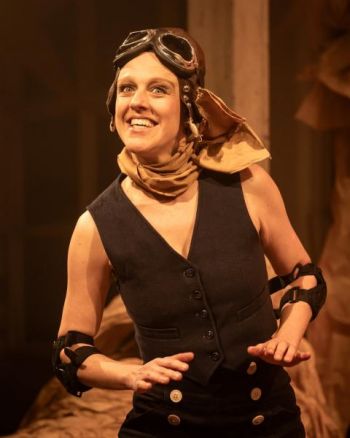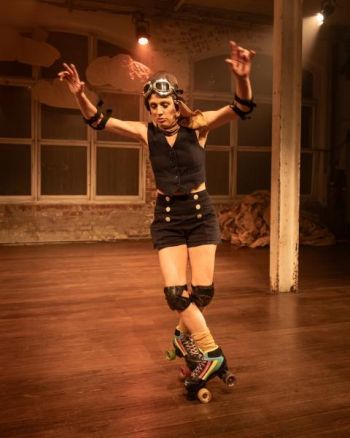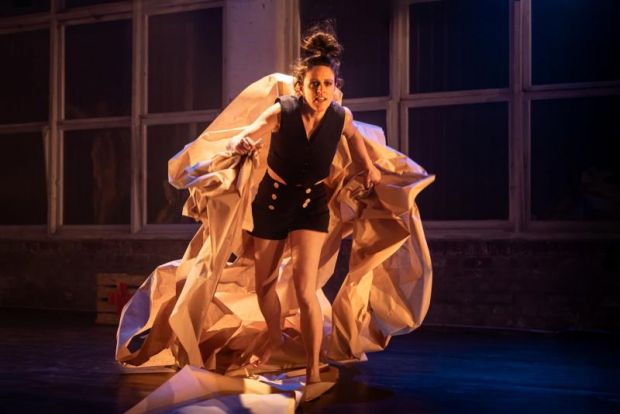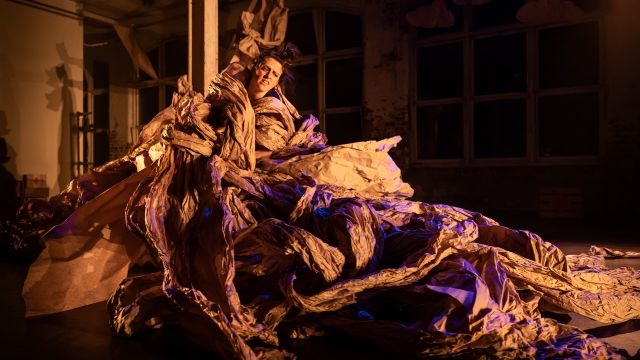Happy-Go-Wrong
Andi Snelling’s creative process is to set her imagination loose so that she or it comes up with images, scenes, lines of dialogue or direct address in no particular order. She films these inspirations just for herself, looks at them and asks, ‘Am I interested in this? Would an audience be interested in this? Is it funny? Sad? Connect with anything else?’ Initially, there is no narrative thread, but the process yields, she says, hundreds of bits and pieces – which she then winnows and edits and kills her darlings sometimes, and strings what’s left together.
 The dangers of her method are obvious and when she settles on the selection that she decides (not necessarily rationally or objectively) will make up a show, that show could easily fall into self-indulgence. Or it could be a type of fringe festival piece that we see rather often: a string of bits and bobs, in no particular order, punctuated by black-outs – some, yes, individually brilliant – and although we’ll laugh or be moved on the way through, we’re left dissatisfied.
The dangers of her method are obvious and when she settles on the selection that she decides (not necessarily rationally or objectively) will make up a show, that show could easily fall into self-indulgence. Or it could be a type of fringe festival piece that we see rather often: a string of bits and bobs, in no particular order, punctuated by black-outs – some, yes, individually brilliant – and although we’ll laugh or be moved on the way through, we’re left dissatisfied.
Snelling skilfully avoids that trap via three virtues. First, no matter how disparate the elements of her show, they are all directed to the one end: she has a powerful theme that knits it all together – and here that’s Death and how we resist it. Having been completely debilitated by Lyme’s Disease - a condition still denied by many doctors - so that she thought she could never create again, this show is her resistance and recovery and a chance in passing to have a whack at the medical profession.
Second, the images and characters she creates may make no immediate sense, but they are so intriguing and arresting that we engage and interpret them.
Third, there is Snelling herself as a performer. Attractive, lithe, graceful and engaging, with an individual charisma, she connects with the audience – even in a big empty space like the fortyfivedownstairs theatre. She creates an intimacy that leads the audience to be charmed, affectionate, and prepared to indulge the crazy whims that she performs with such confidence and élan that out attention never wavers.

Here, she arrives on stage on roller skates, lit only by the flashlight she holds in her hand. She has a lot of fun with the roller skates – and you have to be good to pretend to be this bad. She is a French angel. We see no wings, but she makes us imagine them – and those wings are a sort of motif she repeats throughout perhaps extending to the idea that we all have wings. Why is she French? Perhaps because there’s a hint of Existentialism with its emphasis on choice and actions that is so relevant to her theme.
The ideas that come to Snelling don’t of course come out of the blue. She is subject, like any artist, to influences, to the zeitgeist, and what’s penetrated to her inner self and stayed there. Apart from the French angel, we don’t know what came to her, but what’s on stage is rich enough. The piles and piles of brown wrapping paper that dot the stage and in which Snelling becomes entangled, smothered and hidden, reminded me strongly of Beckett’s Happy Days. In one of the funniest – and saddest - sequences, Snelling, in a cut very short garbage bag dress, jams on a blonde wig and hobbles up and down the stage in very high heeled red shoes. These signs of ‘glamour’ ironically rob Snelling of all her glamour, but we realise these are the things a woman does to be noticed. The soundtrack is relentless Latin dance music, reminiscent – for me, anyway – of a dreadful Marguerite Duras movie...
Earlier, by contrast, she dances to ‘Make ‘em Laugh’, sung by Donald O’Connor in Singin’ in the Rain. The connections, piece to piece, considered and felt, are clear. By the end, Snelling stops ‘performing’ and becomes completely vulnerable and open to the audience with a plea to keep going, to not surrender – as she was tempted to do – but to resist death and go on. Okay, it’s not the most original conclusion, but as she delivers it, it is poignant and it is how the whole show delivers it that matters.

This is the eighth iteration of Happy-Go-Wrong and I confess I’ve not seen earlier versions of what began as an ‘exploration’ at La Mama – but this version, refined perhaps, works beautifully.
Michael Brindley
Photographer: Darren Gill
Subscribe to our E-Newsletter, buy our latest print edition or find a Performing Arts book at Book Nook.

